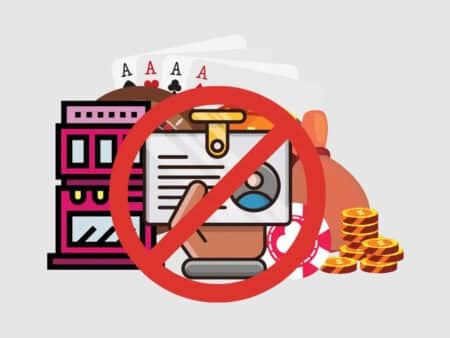Top Dog Casinos looks into problem gamblers, gambling addiction and how online casinos and sportsbooks have affected the issue
Last Updated: May 4, 2023
The number of problem gamblers has been on the rise in recent years. In Michigan, The Michigan Problem Gambling Helpline (MPGH), 800-270-717, reported a 100% increase in gambling-related calls in March 2021. And in April 2021, it got worse as more gamblers sought help with addiction.
To put it into perspective, MPGH received 182 calls in March 2020, which then more than doubled to 398 in March 2021. Moreover, compared to April 2020, when it received 102 calls, in April 2021, that figure tripled to 386 calls.
The New York State Hopeline reported similar year-over-year increases after it launched legal online sports betting. During the first three months of 2022, it reported a 40% increase in the number of gamblers seeking help. However, in April, the rate dropped to 11%.
So what is driving these players to gambling problems? Some industry analysts point to the aggressive marketing campaigns by online casinos. And another point to the ease of access to online games available today.
However, the one thing they all agree on is casinos and gambling authorities to take more drastic actions to help problem gamblers and those that are most at risk.
What Survivors Say about Gambling Addiction
Lou Remillard is among players who have chosen to seek help after he became a gambling addict. The 46-year-old still remembers the last bet – $2,000 – he wagered on a Major League Baseball game and lost.
He felt broken and did not care about being alive anymore. He already had a debt running into tens of thousands of dollars resulting from his gambling losses. That is when he decided to seek help. He walked into a 12-step meeting the next day.
That was on October 1, 2018, a day that he says he protects to this day. On that date, he agreed to stop gambling, stay sober, and help those that are facing a similar predicament.
He says that life has not been easy for many gambling addicts. Many are still struggling with the stresses of the 2019 pandemic. They feel alone and ashamed, and they are often in debt or broke.
But Remillard assures them they are not alone. He facilitates online morning recovery meetings regularly on weekends. However, meetings such as those are not reaching all gambling addicts. As of 2022, there are about 2 million Americans struggling with gambling addiction.
Bea Aikens says that she struggled with a gambling addiction for years. She went as far as to open a second post office box to hide the piling bills from family. And even after they found out she was an addict, they didn’t grasp how deep it was.
Aikens has been in recovery for 25 years. Over time, she has helped to educate other addicts in the 12-step problem gambling meetings. She says gambling addiction is a disease and not a weakness.
The struggle is not with money but with increased dopamine levels. And the addiction often overlaps with others, such as drug addiction. A case in point is her sister Laine, who was also a gambling addict.
Laine died of a drug overdose in 2008, after she had been clean for several years. But when Aikens went through her car, she found casino receipts. That is when she realized Laine had relapsed.
In honor of her sister, Aikens now shares her story and that of her sister with others. She hopes her story can help others learn that gambling recovery is a continuous life process. Hopefully, their stories will inspire new and existing addicts to get help.
The National Council on Problem Gambling (NCPG) did a survey in March 2021 of 2,000 people. The survey found gambling addiction has been on the rise since 2018. And those affected frequent online casinos and land-based casinos.
The interview focused on gambling attitudes and experiences. 73% of those interviewed confessed they hand gambled over the last year. And 66% said they had bought a lottery ticket, while 41% said they had bought a raffle ticket.
However, 15% said they had gambled online or on a website or app on a mobile device. That is 12% within three years. This significant growth was occasioned by the need for social distance in the 2020-2021 pandemic.
While online casinos are legal in just a few states, anyone with a computer or smartphone and internet connection can access them from any state.
What Analysts Say is Driving Problem Gambling
According to the National Council on Problem Gaming, recent research suggests that mobile and internet technologies are contributing to betting and gambling addiction.
They do it in two ways. First, they create unlimited opportunities to wager. And two, they make it convenient to place wagers 24/7. Players do not need to walk to a casino to wager anymore.
That makes it easy for problem gamblers to gamble privately and conveniently. When sports bettors were asked how they placed wagers, 63% said they did it through an online sportsbook. That was 6% more than those that said they did it at a brick-and-mortar sportsbook.
Moreover, the aggressive marketing and advertising campaigns make it harder for gamblers to quit. For instance, in the 2021 NCPG survey, 63% of the respondents felt operators should implement responsible gambling measures.
According to Jeff Bell, CEO of LegalShield, authorities need to hold online sports betting operators accountable. They have to use the same standards they use on brick-and-mortar casinos.
Bell concluded by saying he is a supporter of technology and a sports fan. However, he believes the cost of allowing online sports betting companies to self-regulate is too high.
How to Protect Players from Gambling Addiction
Credit Cards
It is easy for problem gamblers to get into huge debts using their credit cards. By banning the use of credit cards in online casinos, gamblers are forced to use the money they have earned only. And even if they can get loans, they are limited to only a few options.
However, for this approach to work, all stakeholders in the credit card industry need to work together. That means banks and e-wallets have to work with online casino operators to enforce the ban.
However, players are free to use their debit cards and bank account balances. That can then help vulnerable gamblers to limit their exposure to gambling losses easily.
Affordability Checks
Online casinos are now required to do affordability checks on their customers. The checks must show that the customer has sufficient funds to gamble on their platforms.
That means online casinos have to ensure customers can afford to spend the daily, weekly, and even monthly funds they are spending. Licensing authorities are now imposing up to seven-figure fines if they find that an online casino is not compliant.
Cool-off Periods
Online casinos now have to offer players self-exclusion tools. With such tools, customers can impose a self-ban for days, weeks, months, or even years. Moreover, casinos are required to impose mandatory cool-off periods.
The mandatory cool-off periods can trigger after a player loses a certain amount of money. The amount can be lower or higher depending on the player’s monthly income. The gaming software can also trigger it if a player plays for a prolonged period, such as an entire night.
The cool-off period can be in the form of slow spins, a longer pause after a spin, or an automatic log-off. Overall, the goal is to prevent the player from falling into a “gambling loss spiral.”
Bet Sizes
Some gambling jurisdictions now require that online casinos must place a maximum bet limit size. And those limits for slots can be as low as $2. Authorities believe that can limit the losses a player can incur. However, casinos argue that such low limits can easily put them out of business.
Monthly Losses
Most gamblers are everyday working-class citizens who rely on their paychecks to gamble. Therefore, a limit on the monthly amount players can gamble can stop the rising gambling problem.
And online casinos can work with banks and e-wallets to stop their players from wagering excessively. Using KYC and AML, online casinos can impose wagering limits on their players.
But not all jurisdictions have such requirements. That can make it easy for players to just hop to an online casino in a jurisdiction without such requirements and continue to bet. However, if banks and payment processors are involved, they can monitor and stop such payments.
Donate to NCPG
Online casinos can donate some of their profits to NCPG to help players who have become addicted to gambling. And those that make the most profits should donate more.
Some casinos such as FanDuel are already doing that. For instance, In March 2022, they announced a donation of $100,000 to the NCPG. They also announced the launch of a safe betting campaign. The campaign will run throughout the year as a TV advert.
Conclusion – Problem Gambling in 2023
Online casinos and sports betting are the future of gambling. It is not only economical to run online gaming operations, but it is also convenient for players. Governments are also getting higher revenues from online casinos.
However, governments and gambling stakeholders must take steps to protect those vulnerable to problem gambling and those that are already addicted. Overall, casinos should notify players once they detect a player meets the clinical requirements of having a gambling disorder.
About the Author


















